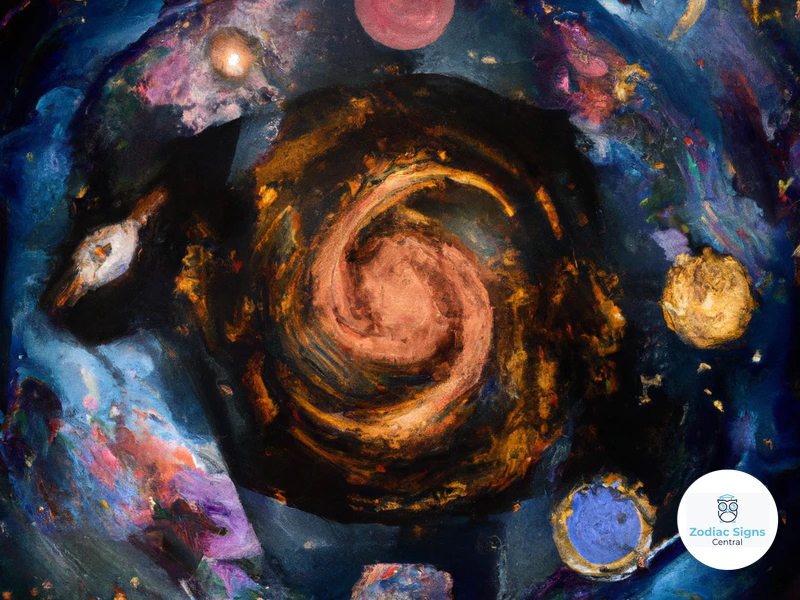Astrology, a fascinating discipline that seeks to understand the influence of celestial bodies on human behavior and destiny, has long intrigued and captivated individuals around the world. Among the many facets of astrology, the concept of astrological compatibility holds a particular allure. How do the elements, those fundamental building blocks of nature, play a role in determining compatibility between individuals? In this article, we will embark on a journey to explore the intriguing influence of elements in astrological compatibility. By delving into the characteristics and compatibility of fire, earth, air, and water signs, we aim to shed light on the interconnectedness of these elements and their impact on our relationships. So, let us embark on this cosmic exploration and unravel the mysteries that lie within the influence of elements in astrological compatibility.
The Four Elements

Astrology categorizes the zodiac signs into four elements: fire, earth, air, and water. Each element possesses its own distinct characteristics and qualities, which greatly impact an individual’s personality and behavior. Fire signs, such as Aries, Leo, and Sagittarius, are passionate, dynamic, and energetic. They are known for their creativity, enthusiasm, and ambition. Earth signs, including Taurus, Virgo, and Capricorn, are known for their practicality, stability, and grounded nature. They value security, material possessions, and have a strong work ethic. Air signs, such as Gemini, Libra, and Aquarius, are intellectual, social, and communicative. They thrive on connection, intellectual stimulation, and are often seen as the social butterflies of the zodiac. Lastly, water signs, including Cancer, Scorpio, and Pisces, are sensitive, intuitive, and emotional. They are deeply empathetic, nurturing, and often have a strong connection to their emotions and the emotions of others. Each element plays a significant role in shaping an individual’s personality and preferences, laying the foundation for their compatibility with others in matters of love, friendship, and even professional relationships. But how does the compatibility between elements unfold? Let us explore the influence of elements in astrological compatibility.
Fire Signs
Fire signs, which include Aries, Leo, and Sagittarius, are known for their fiery and passionate nature. Strong-willed and assertive, these signs possess an infectious enthusiasm that lights up any room they enter. Their vibrant energy and natural charisma make them magnetic and dynamic individuals. Fire signs are driven by their desires and are not afraid to take risks to achieve their goals. Their sense of adventure and love for excitement often leads them to seek out new experiences and challenges. Fire signs are creative and often have a natural talent for leadership. They are enthusiastic about their pursuits and are highly motivating to those around them. However, their fiery nature can sometimes lead to impatience and a tendency to be impulsive. It is important for individuals with fire signs to learn how to channel their energy in a productive manner to avoid potential conflicts and frustrations. Fire signs bring a spark of enthusiasm and inspiration to any relationship or situation they encounter. Their compatibility with other elements will be explored further in the subsequent sections of this article. So, let us now move on to explore the compatibility of fire signs with other astrological elements.
Characteristics
Fire Signs:
- Aries: Known for their leadership qualities, courage, and determination. They are adventurous, dynamic, and have a strong sense of self.
- Leo: Highly expressive, proud, and generous. They possess natural charisma, a love for the limelight, and a warm-hearted nature.
- Sagittarius: Adventurous, optimistic, and philosophical. They have a thirst for knowledge, love exploration, and embrace change.
Earth Signs:
- Taurus: Grounded, reliable, and practical. They value stability, security, and enjoy the finer things in life.
- Virgo: Detail-oriented, analytical, and methodical. They possess a keen eye for perfection, are hardworking, and thrive on organization.
- Capricorn: Ambitious, disciplined, and responsible. They are driven by success, value tradition, and possess excellent leadership skills.
Air Signs:
- Gemini: Versatile, curious, and intellectual. They possess excellent communication skills, are sociable, and adapt easily to various situations.
- Libra: Diplomatic, harmonious, and fair-minded. They value balance, seek justice, and possess natural charm.
- Aquarius: Independent, inventive, and open-minded. They have a rebellious streak, value intellectual freedom, and possess a humanitarian mindset.
Water Signs:
- Cancer: Nurturing, emotional, and intuitive. They are deeply connected to their emotions, possess a strong intuition, and are fiercely protective of their loved ones.
- Scorpio: Intense, passionate, and mysterious. They possess a magnetic charisma, are highly perceptive, and value loyalty.
- Pisces: Empathetic, imaginative, and compassionate. They are highly intuitive, possess strong artistic abilities, and have a deep connection to spirituality.
Elements in Relationships
When it comes to relationships, the elements in astrology provide valuable insights into compatibility dynamics. Complementary elements often create a sense of harmony, as they share similar qualities and understand each other’s needs and desires. For example, fire and air signs tend to have a natural synergy. Fire fuels the air, while air provides the oxygen that sustains fire. Their shared attributes of spontaneity, passion, and intellectual connection create a vibrant and exciting partnership. Similarly, earth and water signs complement each other through their shared traits of practicality, emotional depth, and stability. Earth grounds the water, providing a solid foundation, while water nourishes the earth, fostering growth and emotional connection. These relationships are built on a strong understanding and support for one another’s fundamental needs. On the other hand, challenging elements can create a more dynamic and intense partnership. Fire and water signs, for instance, often face inherent conflicts due to their opposing natures. Fire seeks to ignite and expand, while water desires emotional depth and introspection. This clash can lead to passionate and transformative relationships, but also potential power struggles and emotional turmoil. Similarly, air and earth signs may struggle to find common ground, as air prioritizes intellectual stimulation and social connection, while earth focuses on practicality and stability. These differences can be a source of tension, but with understanding and compromise, they can also lead to a balanced and complementary partnership. Astrological compatibility takes into account these dynamics, allowing individuals to better understand the lessons and growth opportunities presented by their relationships. Whether complementary or challenging, the influence of elements in astrological compatibility adds depth and complexity to our connections with others. It serves as a valuable tool for self-discovery, understanding, and navigating the intricate dance of relationships. So, embrace the wisdom of the elements and explore the fascinating world of astrological compatibility.
Complementary Elements
When it comes to astrological compatibility, certain elements are considered complementary to each other. These combinations tend to enhance and support each other’s strengths and characteristics, creating a harmonious and balanced dynamic. Let’s explore these complementary elements:
1. Fire and Air: Fire signs and air signs are highly compatible due to their shared enthusiasm, energy, and social nature. Fire ignites air, fueling the flames of creativity and inspiration. Air provides the necessary oxygen for fire to thrive, making this combination dynamic, exciting, and full of passion. Together, they can embark on exciting adventures, fuel each other’s passions, and engage in stimulating intellectual conversations.
2. Earth and Water: Earth signs and water signs form a harmonious bond rooted in emotional depth and stability. Earth provides a solid foundation for water to flow and nurture. Water, in turn, nourishes and supports the growth of earth. This combination creates a sense of security and emotional understanding. The practicality and grounded nature of earth signs blend seamlessly with the emotional depth and intuition of water signs, resulting in a strong and stable connection.
These complementary elements provide a natural balance, as they bring together qualities and energies that support and enhance each other. The shared values, interests, and approaches to life create a strong foundation for a harmonious and fulfilling relationship. Whether it’s romance, friendship, or partnership, complementary elements often experience a deep understanding and compatibility that can withstand the test of time. So, if you find yourself drawn to someone with a complementary element, pay attention to the potential for a strong and balanced connection.
(Note: To learn more about the role of the Sun in astrology, click [here](/role-sun-astrology/).)
Challenging Elements
Challenging elements in astrological compatibility refer to combinations of zodiac signs that tend to clash and create friction in relationships. When two signs belong to elements that are opposite or incompatible, it can lead to misunderstandings, conflicts, and difficulties in finding common ground. One example of a challenging element pairing is fire and water. Fire signs, with their fiery and passionate nature, may overwhelm the emotional and sensitive water signs. Their differing approaches to handling emotions and desires can create tension and misunderstandings. Another challenging combination is earth and air. While earth signs seek stability, practicality, and routine, air signs are imaginative, spontaneous, and prefer the freedom to explore ideas and concepts. This difference in approach to life can create a clash of priorities and a struggle to find common ground. It is important to note that challenging elements do not necessarily mean that a relationship is doomed. With understanding, communication, and compromise, even challenging element pairs can learn to appreciate each other’s strengths and work through their differences. It requires a willingness to listen, adapt, and find a balance that honors both individuals’ needs and desires. So, while challenging elements can present unique obstacles, they also offer an opportunity for growth, learning, and the strengthening of relationships.
Conclusion

In conclusion, the influence of elements in astrological compatibility is a captivating and intricate aspect of astrology. The four elements – fire, earth, air, and water – play a significant role in shaping an individual’s personality and compatibility with others. Understanding the characteristics and compatibility of these elements can provide valuable insights into our relationships and interactions with others. Fire signs bring passion and creativity, while earth signs provide stability and practicality. Air signs bring intellectual stimulation, and water signs offer emotional depth. When it comes to compatibility, complementary elements often harmonize well together, such as fire with air or earth with water. These combinations can create a balanced and harmonious relationship. On the other hand, challenging elements, such as fire with water or earth with air, may require more effort and understanding to find common ground. However, it is important to remember that astrology is just one tool for understanding compatibility, and relationships are complex and unique to each individual. Ultimately, the true strength of a relationship lies in the connection, communication, and mutual respect between individuals. Embracing the influence of elements in astrological compatibility can offer valuable insights and enhance our understanding of ourselves and the dynamics of our relationships. So, let the elements guide us on this fascinating journey of self-discovery and connection with others.
Frequently Asked Questions
1. How are the elements determined in astrology?
In astrology, the elements are determined based on the zodiac sign’s assigned element. Each zodiac sign is associated with one of the four elements: fire, earth, air, or water.
2. What are the main characteristics of fire signs?
Fire signs are known for their passion, creativity, and energy. They are often charismatic, bold, and enthusiastic individuals who love to take charge and pursue their desires with fervor.
3. Which zodiac signs fall under earth signs?
The zodiac signs that fall under earth signs are Taurus, Virgo, and Capricorn. Earth signs are practical, stable, and grounded individuals who value security and material possessions.
4. How would you describe the traits of air signs?
Air signs, such as Gemini, Libra, and Aquarius, are known for their intellectual nature, social skills, and communication prowess. They thrive on relating to others and seeking intellectual stimulation.
5. What are some of the characteristics of water signs?
Water signs, including Cancer, Scorpio, and Pisces, are known for their emotional depth, sensitivity, and intuition. They possess a strong ability to empathize with others and are often nurturing and compassionate.
6. Are some elements more compatible than others in astrology?
Yes, in astrology, certain elements tend to be more compatible with each other. Fire and air signs generally harmonize well together, as do earth and water signs. However, each individual’s full birth chart should also be considered for a complete assessment of compatibility.
7. Can individuals with opposing elements have a successful romantic relationship?
Yes, individuals with opposing elements can have successful romantic relationships. These relationships often create a dynamic balance and complement each other’s strengths and weaknesses. However, they may also encounter challenges that require compromise and understanding.
8. How does astrological compatibility impact friendships?
Astrological compatibility can influence friendships by providing insight into our compatibility with others in terms of communication, shared interests, and emotional connection. Understanding compatibility can strengthen friendships and help navigate potential conflicts.
9. Are there ideal career matches based on astrological elements?
Astrological elements can provide insights into career preferences and strengths. For example, fire signs are often drawn to creative fields, while earth signs thrive in practical and structured environments. Air signs excel in communication-based careers, and water signs are often drawn to nurturing professions.
10. How can understanding astrological compatibility enhance our relationships?
Understanding astrological compatibility can enhance relationships by providing insights into our own and our partner’s core traits, values, and communication styles. It can foster understanding, empathy, and help navigate challenges by finding common ground and areas of compatibility.
References
- Zodiac Element Meanings Can Reveal A Lot About Sign …
- understanding the Elements in Astrology and Their …
- Fire, water, earth, or air—here’s what your zodiac element …
Frequently Asked Questions
1. Can astrological compatibility be determined by the elements?
Astrological compatibility can indeed be influenced by the elements. Each element represents different personality traits and energies, and understanding these can provide insight into how well two individuals may relate to each other.
2. What are the characteristics of fire signs?
Fire signs, including Aries, Leo, and Sagittarius, are known for their passion, enthusiasm, and impulsivity. They are often bold, adventurous, and full of energy.
3. Do earth signs make compatible partners?
Earth signs, like Taurus, Virgo, and Capricorn, are generally seen as reliable, practical, and grounded individuals. They often make compatible partners due to their stability and their ability to offer support and security.
4. Are air signs more compatible with other air signs?
Air signs, such as Gemini, Libra, and Aquarius, are known for their intellect, communication skills, and social nature. While they can have a good rapport with other air signs, they can also find compatibility with individuals from different elements.
5. What are the characteristics of water signs?
Water signs, like Cancer, Scorpio, and Pisces, are compassionate, intuitive, and emotionally sensitive. They often have deep emotional connections and are highly attuned to the feelings of others.
6. Can complementary elements enhance compatibility?
Yes, complementary elements can enhance compatibility. For example, fire and air signs tend to have a natural synergy due to their energetic and intellectual nature, respectively.
7. Do challenging elements always lead to conflict in relationships?
Challenging elements can bring both growth and conflict in relationships. While they may initially cause friction, they can also provide an opportunity for personal development and understanding between partners.
8. Can individuals with different elemental signs have a harmonious relationship?
A harmonious relationship is possible even if individuals have different elemental signs. It is important to focus on communication, understanding, and finding common ground to create a strong bond.
9. How can understanding the elements improve relationship dynamics?
By understanding the elements, individuals can gain insights into their own and their partner’s natural traits and tendencies. This understanding can facilitate effective communication, mutual respect, and appreciation, leading to improved relationship dynamics.
10. Is astrological compatibility the sole determinant of relationship success?
No, astrological compatibility is not the sole determinant of relationship success. While it can provide valuable insights, factors such as communication, trust, shared values, and personal growth also play crucial roles in the success of a relationship.
References
- What’s My Zodiac Sign Element? Fire, Earth, Air, & Water …
- Love Compatibility with Astrology Elements






